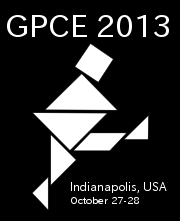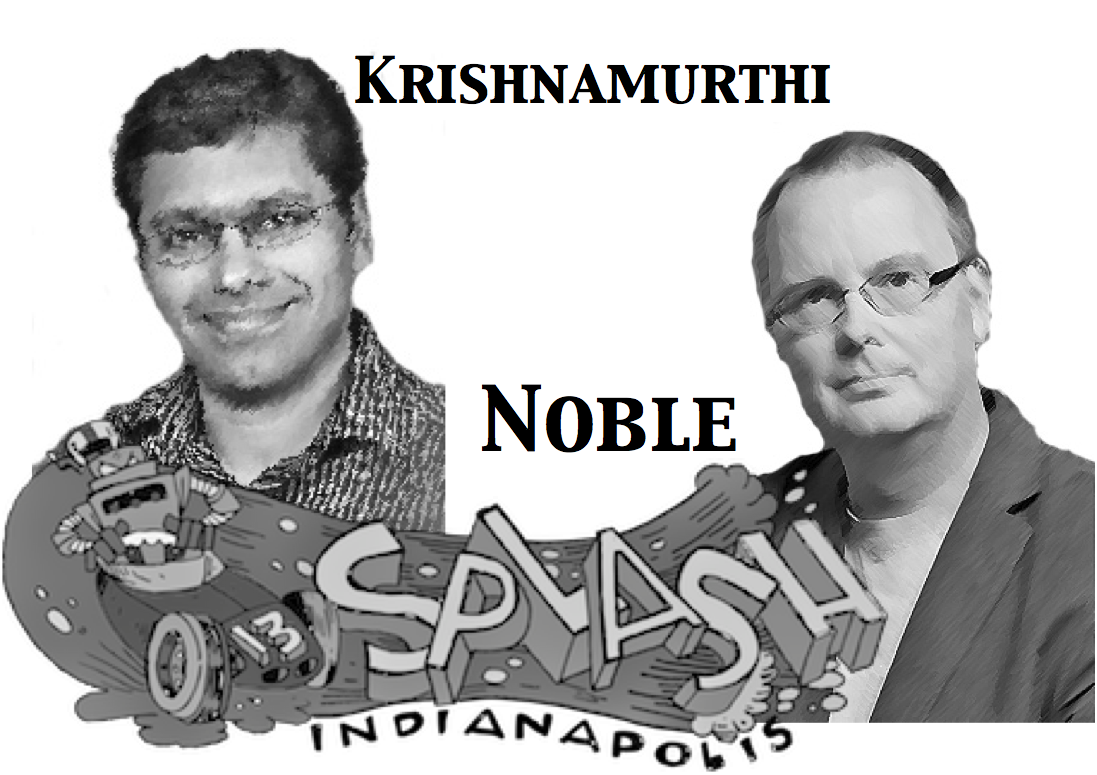Keynote Speakers
Toward the future of personal computing system construction
Yoshiki Ohshima
TouchDevelop: Productive Scripting on and for Touch-based Devices and Web Services
Thomas Ball
VMs I Have Known and/or Loved
Mario Wolczko
Do Computer Programs Have to Be As Dumb As They Are?
Xipeng Shen
Dark Knowledge and Graph Grammars in Automated Software Design
Don Batory
The Yin and Yang of Hardware Heterogeneity: Can Software Survive?
Kathryn S McKinley
Refactoring, Reuse & Reality: Revisited
Bill Opdyke
Back to the Future: SIMULA style concurrent objects
Ole Lehrmann Madsen
TS*: Gradual Typing Embedded Securely in JavaScript
Nikhil Swamy
Mobile Computing in Resource-Constrained Environments
Grace Lewis
Does Thought Crime Pay?
Gilad Bracha
Making Live Programming Real
Sean McDirmid
Modeling Biology with Solver-Aided Programming Languages
Rastislav Bodík
Two Solitudes
Greg Wilson
FOOL @ 20
Kim Bruce
JavaScript as an Intermediate Language
Shriram Krishnamurthi
MobileFirst: Future Directions in Programming and Runtime Models
Gabi Zodik
Declarative Programming for the Cloud
Molham Aref
SPLASH 2013
OOPSLA
OOPSLA is the premier conference on Object-Oriented Programming, having been the forum for some of the most important software developments over the last couple of decades. OOPSLA was the incubator for CRC cards, CLOS, design patterns, Self, agile methodologies, service-oriented architectures, wikis, UML, test driven design, refactoring, Java, dynamic compilation, and aspect-oriented programming, to name a few. OOPSLA is not only about objects but it never strays far from them. >>>

New this year, authors of OOPSLA papers were invited to submit supporting materials to the Artifact Evaluation process. The goal of the Artifact Evaluation process is to empower others to build upon the contributions of a paper. Papers that went through the Artifact Evaluation process received a seal of approval.
Onward!
Onward! is a multidisciplinary conference focused on everything to do with programming and software: including processes, methods, languages, communities, and applications. Onward! is more radical, more visionary, and more open than other conferences to not yet well-proven but well-argued ideas. >>>
SLE
The International Conference on Software Language Engineering (SLE) is devoted to topics related to artificial languages in software engineering. SLE’s mission is to encourage and organize communication among communities that have traditionally looked at software languages from different and yet complementary perspectives. Of particular relevance to SLE are technologies, methods, experiments, and case studies on software languages from researchers and practitioners who use modeling, grammar, or ontology-based approaches. >>>

GPCE
Generative and component approaches and domain-specific abstractions are revolutionizing software development just as automation and componentization revolutionized manufacturing. Raising the level of abstraction in software specification has been a fundamental goal of the computing community for decades. Key technologies for automating program development are Generative Programming for program synthesis, Domain-Specific Languages for compact problem-oriented programming notations, and technologies aiming at modularity, correctness, reuse, and evolution. >>>

DLS
The 9th Dynamic Languages Symposium is a forum for discussion of dynamic languages, their implementation and application. While mature dynamic languages including Smalltalk, Lisp, Scheme, Self, Prolog, and APL continue to grow and inspire new converts, a new generation of dynamic scripting languages such as JavaScript, Python, Ruby, PHP, Tcl, Lua, and Clojure are successful in a wide range of applications. DLS provides a place for researchers and practitioners to come together and share their knowledge, experience, and ideas for future research and development. >>>

Panels and debates
SPLASH will host a panel on Technical Debt chaired by Steven Fraser with panelists from Microsoft, Cisco, JP Morgan, SEI and CAST. The term “Technical Debt” was coined by Ward Cunningham in a 1992 OOPSLA experience report. The technical debt describes the trade-offs between delivering the most appropriate - albeit likely immature - product, in the shortest time possible. A debate will pit Shriram Krishnamurthi against James Noble on the issue of the rightful place of software in software conferences. Should software conferences insist on reproducibility of research results? And if so, at what price? >>>
Workshops
Following its long-standing tradition, SPLASH hosts a variety of high-quality workshops, allowing their participants to meet and discuss research questions with peers, to mature new and exciting ideas, and to build up communities and start new collaborations. SPLASH workshops complement the main tracks of the conference and provide meetings in a smaller and more specialized setting. Workshops cultivate new ideas and concepts for the future, optionally recorded in formal proceedings.
Wavefront
Wavefront is a forum for presenting and discussing new and innovative tools, technologies, and practices for use in today’s software community. Wavefront is about how industry applies the lessons learned from the software development community in deploying today’s software and systems, and how the community can learn from what is happening in the trenches of software engineering. >>>
Wavefront Experience Reports are all about how we create practical software systems that solve real-world problems. Wavefront experience reports are meant to be strongly aligned with the focus of the Wavefront program, but in the experience papers, we are looking for discussions about the use of those technologies as opposed to their creation. How have they made you more (or less) successful? What do you do differently now? >>>
Tutorials & Tech Talks
The SPLASH tutorial program complements research talks with 80-minute tech talks and 1/2-day in-depth tutorials taught by experts that provide participants with in-depth or hands-on background in the area of focus. The tutorials and tech-talks are open to all attendees. >>>

SPLASH-I
SPLASH-I is a new series of industrial research talks that address topics relevant to the SPLASH community. Speakers are world-class experts in their field, selected and invited by the organizers. The SPLASH-I talks series is held in parallel with the OOPSLA main track. Talks are open to all attendees. >>>
SPLASH-E
SPLASH-E revives the long tradition at OOPSLA and SPLASH of bringing educators, practitioners, and researchers together to improve the teaching of programming and software development. >>>
Posters
The poster session provides an excellent forum for authors to present their recent or ongoing projects in an interactive setting, and receive feedback from the community. >>>
Doctoral Symposium
The SPLASH Doctoral Symposium provides students with useful guidance for completing their dissertation research and beginning their research careers. >>>
Demonstrations
Live demonstrations show the impact of software innovation. The Demonstrations track is an excellent vehicle for sharing your latest work with an experienced and technically savvy audience. Demonstrations are not product sales pitches, but rather an opportunity to highlight, explain, and present interesting technical aspects. >>>
ACM Student Research Competition
The student research competition is an internationally-recognized venue that enables undergraduate and graduate students to experience the research world and share their research results. The competition has separate categories for undergraduate and graduate students and awards prizes to the top three students in each. >>>
Student Volunteers
The SPLASH Student Volunteer program provides an opportunity for students from around the world to associate with some of the leading personalities in industry and research in the following areas: programming languages, object-oriented technology and software development. >>>
Social Events
SPLASH includes a number of social events, a reception will be held in the hotel on Sunday for GPCE, SLE and the workshop attendees, the SPLASH banquet is on Wednesday evening at the Indiana Roof Ballroom, and SPLASH, as usual will end on a sweet note with the Ice Cream Social on Thursday in the conference hotel.